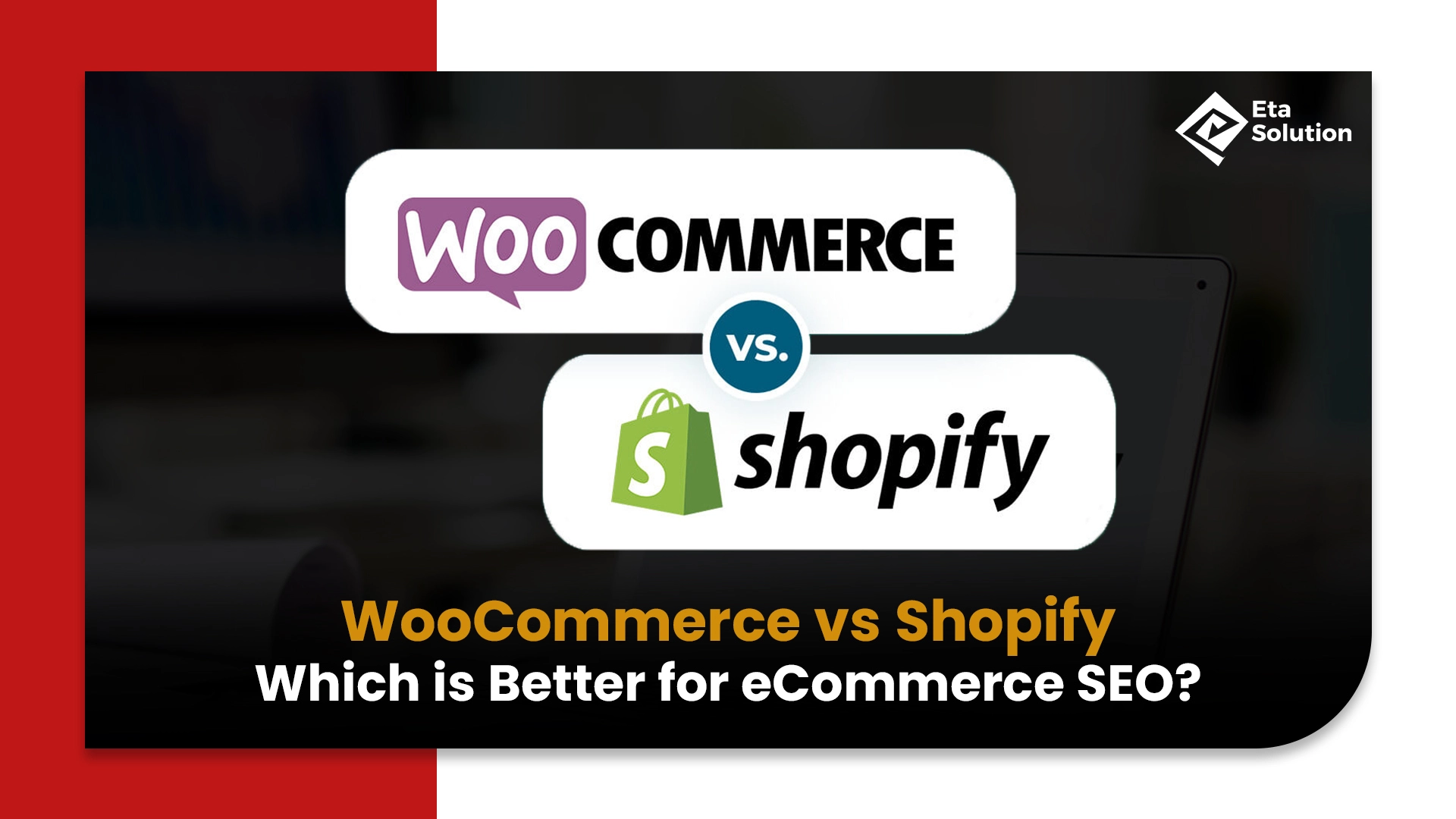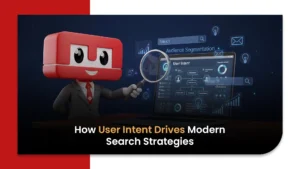
WooCommerce vs Shopify: Which Platform is Best for eCommerce SEO?
When it comes to owning a successful online shop, SEO becomes your long-term sales machine. But even then, so many business owners continue to get stuck in angry rants about the best eCommerce platform to utilize and overlook the one thing that actually matters: SEO regarding visibility, traffic, and conversion. The Ecommerce Platform you choose can make or break your SEO.
Today, we’ll break down the real differences in WooCommerce vs Shopify for SEO. This isn’t just another comparison blog. We’ll get into the weeds of structured data, sitemaps, speed metrics, mobile-first readiness, and insider tips you won’t find on product landing pages.
Shopify vs WooCommerce 2025: Who truly wins in SEO?
Why Ecommerce SEO Comparison is a Real Differentiator in 2025?
With over 12 million online stores worldwide and more than 30% of all clicks going to the Top-ranking Google result, SEO is no longer a slow-burn strategy – it’s a front-loaded necessity.
According to a 2025 BrightEdge report, 68% of online experiences begin with a search engine, and eCommerce brands that invest early in organic visibility see up to 275% higher ROI compared to paid acquisition over 12 months.
In such a landscape, SEO friendly eCommerce isn’t a trend – it’s survival.
WooCommerce vs Shopify: A Quick Platform Overview
- WooCommerce is an open-source plugin for WordPress and retains total ownership and control, flexibility, plus all the plugins available for WordPress. This is more suitable for users who want to own their technical stack.
- Shopify is a hosted SaaS platform with a streamlined, out-of-the-box experience. It’s beginner-friendly, but with limitations in deep-level customization.
If we’re comparing WordPress vs Shopify SEO, we need to go deeper into how each handles the actual mechanics of optimization.
On-Page SEO Capabilities: Who Gives You More Control?
WooCommerce SEO:
- Total control of your page Meta Titles, Meta Descriptions, slugs, and heading hierarchy.
- Compatible with many of the best plugins, such as Yoast SEO, Rank Math, and All in One SEO, which allow you to edit and customize everything, including URL structure, image alt tags, and breadcrumb trails
Shopify SEO Features:
- Pretty decent built-in SEO tools, but they limit the areas within SEO that allow you to customize
- URL structure generally includes bad prefixes like /products/ and /collections/ that cannot be removed
- You used to be limited in editing your robots.txt and sitemaps, but it has gotten better in 2024-2025.
Winner: WooCommerce is the clear winner when it comes to full-on-page SEO customization.
Blogging and Content: The Underestimated SEO Powerhouse
WooCommerce:
- Blogging is what WordPress was built for.
- Native content hierarchy, tagging, and internal linking are strong.
- You can create SEO content hubs, pillar pages, and highly customized category structures.
Shopify:
- Has a basic blogging tool, but it lacks features like post categories or advanced taxonomy.
- Limited control over content architecture.
72% of WooCommerce stores that publish two or more blogs per week generate more organic traffic within 6 months, per Ahrefs data.
Result: WooCommerce wins again for content-driven SEO.
Site Speed and Performance: Can Google Crawl You Fast Enough?
Shopify:
- Hosted on a high-performance global CDN with automatic caching.
- Fast load times across devices and geographies.
- Shopify sites average a mobile page load time of 1.2 seconds in 2025.
WooCommerce:
- Speed depends on your hosting provider and caching setup.
- It can be equally fast or sluggish based on your server and plugin load.
- With LiteSpeed or Kinsta hosting, WooCommerce stores match Shopify’s speed benchmarks.
Verdict: Shopify is more structured in use, while with the right stack, WooCommerce can be very close.
Mobile-Friendly: Who is more responsive?
With Google telling the world that it favors a mobile-first index, this is an important criterion.
- We would have to give Shopify credit for offering theme templates that are fully mobile responsive with no additional effort when setting up.
- WooCommerce, like most things with it, depends on what the theme you decide to use gives you. Unfortunately, many of the WooCommerce themes that have preceded yours may not have benefited from mobile optimization.
Verdict: Shopify wins due to mobile readiness when setting up, but WooCommerce optimization can achieve the same level of compatibility, with the right WordPress Theme.
Plugins Vs App Ecosystems for more SEO
- WooCommerce: Thousands of SEO plugins with granular control schema injectors, 301 redirect managers, link builder, automatic meta generator, etc.
- From the Shopify app store – good SEO tools, but most of these tools and features will be monthly subscription options.
One of our SEO clients switched from Shopify to WooCommerce as he realized that the SEO stack tools he was using cost $89/month on Shopify, and were free while using all the WordPress plugins on WooCommerce.
Result: Enough said – WooCommerce has better, flexible, and cheaper options than using your own optimisation stack.
Technical SEO: Schema, Canonicals, Sitemaps, and More
- WooCommerce: There is total control via plugins. You can add Schema.org markup by product or post type. Access to robots.txt, canonical URLs, and custom redirects can be performed with ease.
- Shopify: Will automatically create sitemaps and canonical tags for you. Not much flexibility in customizing structured data.
Conclusion: If you want control of the technical SEO aspects of your site, WooCommerce wins.
Customization: Controlling the Code vs Ease of Use
- WooCommerce gives you all the access you need via the codebase, giving you the ability to implement advanced SEO Modifications such as lazy loading, prefetching, or custom schema injection.
- Shopify does not give you access to important SEO files.
If you are working with an amazing Web Development Company, WooCommerce can be a playground for performance SEO upgrades.
Our final verdict: WooCommerce is the clear developers’ choice, because of no restrictions. Shopify is great for an almost-zero code experience.
SEO Pricing Options: Free vs. Paid
- You can optimize your WooCommerce SEO with free plugins and open-source tools.
- The SEO features of Shopify come with recurring monthly fees for the app-based upgrades.
Average Shopify stores spend about $120-$250/month on SEO apps and upgrades, while most of the core SEO features of WooCommerce can potentially cost $0-$30/month depending on your host.
Conclusion: WooCommerce is the longer-term, more economical option for SEO scalability.
Final Thought
If you own a brand with a good content strategy, require deep SEO customization, and have technical skills, then WooCommerce is the best ecommerce SEO platform in 2025.
On the other hand, for speed, simplicity, and set-it-and-forget-it planning-and chances that you do not mind accepting some SEO limitations-Shopify will just go a long way and accommodate small to mid-scale stores.
Compared to WooCommerce, Shopify ships emphasis on SEO, customization, content, technical control, and cost.
That being said, when considering whether to start or migrate your store, always make sure to consult an SEO expert or work with a top Web Development Company in Ahmedabad that understands the SEO attributes of both platforms.
Both WooCommerce and Shopify can help your store rank well on Google, but the outcome depends more on how well you implement SEO practices rather than the platform itself. Shopify provides speed, security, and structured data that supports good rankings, especially for those who don’t want to handle technical stuff. However, WooCommerce, when hosted on a quality server and combined with the right plugins, offers more advanced SEO options — such as customized URLs, in-depth schema markup, and content optimization tools. If you or your team are SEO-savvy or willing to learn, WooCommerce gives you more control over how your site performs in search engines.
Site speed is a critical SEO factor because faster-loading sites improve user experience and reduce bounce rates. Shopify generally loads faster because it’s a fully hosted solution with optimized infrastructure. You don’t have to worry about hosting, caching, or performance tuning — it’s all managed for you. In contrast, WooCommerce speed depends on your hosting provider, theme, and plugins. With the right setup (like using a CDN, lightweight theme, and caching plugins), WooCommerce can be just as fast, but it takes more effort. So, for fast SEO results with less technical hassle, Shopify is a better choice.
Yes, but the level of control differs. WooCommerce lets you dig deep into technical SEO through access to your site’s files, code, and powerful WordPress plugins. You can manually edit robots.txt, htaccess files, customize structured data, and even build SEO landing pages using page builders. Shopify also supports SEO, but it’s more locked-down — for example, you can’t fully customize URL structures or access server-level configurations. So, WooCommerce is more suitable for advanced SEO users, while Shopify caters better to users who want reliable SEO performance without deep technical involvement.
Both Shopify and WooCommerce support mobile-friendly themes, which are essential for SEO. Shopify’s themes are optimized by default for mobile performance and speed, making it easier to meet Google’s mobile-first indexing standards. WooCommerce also allows for responsive design, but you’ll need to choose or customize a good theme and test it yourself. With the right theme, WooCommerce can perform just as well as Shopify on mobile SEO.
Plugins and apps can significantly boost your store’s SEO. WooCommerce, through WordPress, gives access to thousands of SEO tools — including Yoast SEO, Rank Math, and All-in-One SEO. These plugins offer advanced features like schema markup, breadcrumb navigation, redirection tools, and more. Shopify has a range of SEO apps too, such as Plug in SEO and Smart SEO, but they tend to offer fewer features than WordPress plugins. If you want more advanced SEO tools, WooCommerce wins.

What started as a passion for marketing years ago turned into a purposeful journey of helping businesses communicate in a way that truly connects. I’m Heta Dave, the Founder & CEO of Eta Marketing Solution! With a sharp focus on strategy and human-first marketing, I closely work with brands to help them stand out of the crowd and create something that lasts, not just in visibility, but in impact!

How User Intent Drives Modern Search Strategies

20 Marketing KPIs to Track & Improve in 2026


